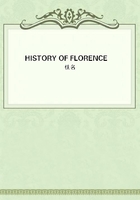
第158章
The weakness of the conspirators was obvious; and many Florentines residing in the town, assembled together, among whom, Giorgio Ginori, a knight of Rhodes, took arms first against them, and attacked Bernardo, who traversed the piazza, alternately entreating and threatening those who refused to obey him, and being surrounded by Giorgio's followers, he was wounded and made prisoner. This being done, it was easy to set the governor at liberty and subdue the rest, who being few, and divided into several parties, were nearly all either secured or slain. An exaggerated report of these transactions reached Florence, it being told there that Prato was taken, the governor and his friends put to death, and the place filled with the enemy; and that Pistoia was also in arms, and most of the citizens in the conspiracy. In consequence of this alarming account, the palace as quickly filled with citizens, who consulted with the Signory what course ought to be adopted. At this time, Roberto da San Severino, one of the most distinguished generals of this period, was at Florence, and it was therefore determined to send him, with what forces could be collected, to Prato, with orders that he should approach the place, particularly observe what was going on, and provide such remedies as the necessity of the case and his own prudence should suggest. Roberto had scarcely passed the fortress of Campi, when he was met by a messenger from the governor, who informed him that Bernardo was taken, his followers either dispersed or slain, and everything restored to order. He consequently returned to Florence, whither Bernardo was shortly after conveyed, and when questioned by the magistracy concerning the real motives of such a weak conspiracy, he said, he had undertaken it, because, having resolved to die in Florence rather than live in exile, he wished his death to be accompanied by some memorable action.
This disturbance having been raised and quelled almost at the same time, the citizens returned to their accustomed mode of life, hoping to enjoy, without anxiety, the state they had now established and confirmed. Hence arose many of those evils which usually result from peace; for the youth having become more dissolute than before, more extravagant in dress, feasting, and other licentiousness, and being without employment, wasted their time and means on gaming and women;their principal study being how to appear splendid in apparel, and attain a crafty shrewdness in discourse; he who could make the most poignant remark being considered the wisest, and being most respected.
These manners derived additional encouragement from the followers of the duke of Milan, who, with his duchess and the whole ducal court, as it was said, to fulfill a vow, came to Florence, where he was received with all the pomp and respect due to so great a prince, and one so intimately connected with the Florentine people. Upon this occasion the city witnessed an unprecedented exhibition; for, during Lent, when the church commands us to abstain from animal food, the Milanese, without respect for either God or his church, ate of it daily. Many spectacles were exhibited in honor of the duke, and among others, in the temple of Santo Spirito, was represented the descent of the Holy Ghost among the apostles; and in consequence of the numerous fires used upon the occasion, some of the woodwork became ignited, and the church was completely destroyed by the flames. Many thought that the Almighty being offended at our misconduct, took this method of signifying his displeasure. If, therefore, the duke found the city full of courtly delicacies, and customs unsuitable to well-regulated conduct, he left it in a much worse state. Hence the good citizens thought it necessary to restrain these improprieties, and made a law to put a stop to extravagance in dress, feasts, and funerals.
In the midst of this universal peace, a new and unexpected disturbance arose in Tuscany. Certain citizens of Volterra had discovered an alum-mine in their district, and being aware of the profit derivable from it, in order to obtain the means of working and securing it, they applied to some Florentines, and allowed them to share in the profits.